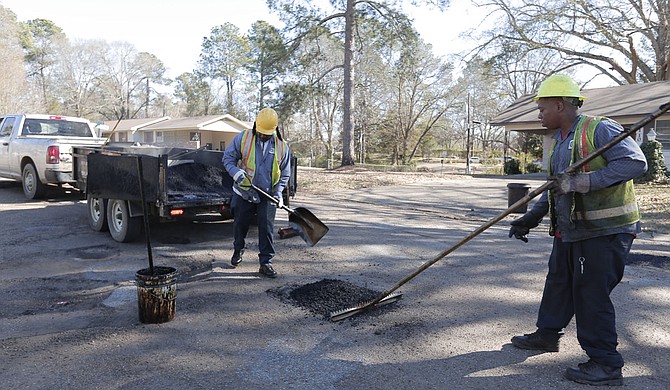Jacksonians can now pick from five phone numbers when reporting issues on the roads. Photo by Imani Khayyam.
JACKSON — The City of Jackson changed how it responds to calls regarding road issues after the fatal crash on May 17—by adding more phone numbers to call to report issues.
The 311 hotline still enters calls into a database and immediately routes the information to the correct division, Director of Action Line and 311 Andy Boone told the Jackson Free Press.
There are five numbers people can call to report issues, and the calls are entered into the same database as 311 calls, Mayor Chokwe A. Lumumba's office said in an email. The changes are relatively recent. He was unavailable for comment because he was on vacation.
Calls regarding potholes and manhole covers have increased since the crash killed Jackson Academy senior Frances "Franny" Fortner, Boone said. Fortner hit a misplaced pothole cover that citizens had alerted the City about earlier in the day, and her car flipped over.
From April 1 to May 18, the hotline received 874 calls that went to the paved streets division, which takes care of potholes and other issues related to the surface of the road, documents obtained by JFP show.
The City closed a total of 227 calls, meaning the reported issues were fixed, usually by filling a pothole. However, 637 calls regarding road repair issues are still open, including incidents where the caller said they damaged their vehicle. Some of the open reports describe barrels or spray paint to alert drivers to the potholes, but then show the potholes were never fixed.
The hotline averages 2,500 calls a month, Constituent Services Manager Keyshia Sanders told the Jackson Free Press. Each operator must get much information as possible from the caller and then determine a priority level: low, medium or high. "From that point, it is then dispatched to respective department and division," Sanders said. Then, the division should respond.
"They will do an assessment," Sanders said. "If it's not something that can be fixed at the current time, they will set up some kind of precautionary measure or some type of preventative measure around the area or whatever the case may be. From there they will come up with a plan, a construction plan, to get it fixed."
The content of the call affects how long it will take to close the report because sometimes the department has to follow a specific protocol, Sanders said.
"Some departments/divisions have a higher closure rate than others just because it might be something that is a construction situation that might take a little bit longer," she said. "It just really depends on the month and the type of call. ... Some of them might take a little bit longer."
The information goes to one of about 25 divisions in the City, depending on the nature of the call. Most of the divisions are under the Department of Public Works, including sewer maintenance and paved roads, Boone said. One of the divisions that takes longer is community improvement, a division the police department handles, Sanders said.
It handles blighted buildings, overgrown properties, among other property issues. Responding to the reports requires court proceedings, as they have to comply with environmental laws, state statues and city ordinances, she said.
Bad weather, a lack of manpower and equipment slows responses, Boone said.
The 311 center has three call representatives and one manager when the department is fully staffed. However, one of the representative positions is vacant, leaving two people to answer the phones, Sanders said. The time it takes for an answer to a call varies greatly depending on the day, she said. After a call rings for a set amount of time, and a representative does not answer it, the caller is able to leave a voicemail.
Reps answer calls from 8 a.m. to 5 p.m. Monday through Friday, and citizens can file online reports through the City of Jackson's website at any time of day. Workers handle online reports the same way as phone calls, meaning they immediately add them to the database and send to the correct department, Boone said.
The 311 hotline does receive calls that are duplicates of earlier reports, as well as calls that are not valid, Sanders said. Sometimes, the operators misidentify a call, which means the call is marked as complete and then refiled in a different division, adding to the total calls received, she said.
"There's various things, but most of them are valid," Sanders said.
The numbers to call for non-emergencies between 7 a.m. and 4 p.m. are 601-960-7684 for potholes and 601-960-1870 for clogged drainage inlets, erosion and cave-ins from water damage.
Emergency concerns during those hours can be reported to 601-960-1234 for missing or loose manhole covers.
Any concerns outside of the hours, report to the Jackson Police Department at 601-960-1234.
Read more at jfp.ms/potholes.


